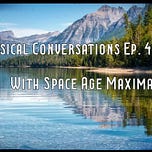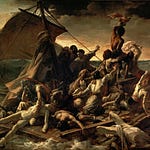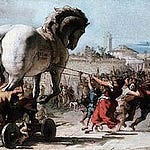Other cool stuff that SAM has done so far:
Substack: Jungle Bunker Telemetric Funk
Twitter: @spaceageherr
Articles: For Space Age Maximalism (see page 48), The Hierarchy of Power
An appearance on the Meta Prime Project
Here is the set of questions that I initially sent SAM:
1. Your third podcast episode is called “Advanced Eschatology and Influences Remix.” You reflect on your project as a whole and you lay out an admirable map of the dissident right terrain. You note that your first major essay, “For Space Age Maximalism,” is principally an emotional appeal that lays out an attractive vision of what could be, and that exhorts engineers to be more based. Could you spend some time laying out this vision before we turn to your more sober assessment of things?
2. In the third episode you also note that getting into space isn’t really a technical problem it is more of a political problem. If, for instance, the United States made going into space a priority instead of fighting forever wars in the Middle East or as you point out in your manifesto if we stopped nannying other countries, we might already be on Mars. But, we seem to be a people who has lost self-confidence and who are in some sense exhausted. What are the first practical steps that could be taken that might help lead us into your Faustian vision of the future?
3. What prevents engineers from being based; or is there anything in the typical engineer’s education that makes them prone to ideological capture?
4. In a Man’s World article entitled, “The Hierarchy of Power,” you offer a rank order of the sciences: biology lowest, then chemistry, then physics, and then mathematics is highest. Could you explain why that rank order is what it is as well as offering a word on where engineering fits into that kind of rank order? I know that the purpose of the article was to analogize that ordering towards types of political power, but since I'm such a neophyte on the sciences, it would be interesting for me / humanities bros to learn
5. In some of our discussion leading up to this, we noted that there seems to be a lack of understanding between scientifically oriented types on one hand, and humanities oriented types on the other; and that, in particular, there is often a disagreement about the status of technology’s goodness. Let’s start by working through some of the limits of technology that you yourself point to, and then if it makes sense, I’ll offer some examples of my own. Much to your credit, you aren’t an easygoing technological cheerleader—you are sensitive to its tradeoffs. In your third episode, you note that technology often has dysgenic effects; the weak prosper under its dispensation. Furthermore, the warrior, one of the highest human possibilities, has a difficult if almost impossible time flourishing; a man with Dorito’s dust can use a drone against him. If increases in technology soften man, prevent warriors from showing forth their excellence, and lead us to depend on complex systems which most of us don’t understand, then how can we place hope in technology to get us out of a situation that it is largely responsible for creating?
Previous classical conversations:
William Wheelwright on agriculture preceding culture, a vision for a new school, and Homer’s Iliad.
Phocaean Dionsyius on Aristocratical Christianity (our second conversation on this)
David Azerrad on the American founding, a diagnostic account of the contemporary situation, and thoughts about how to move forward.














